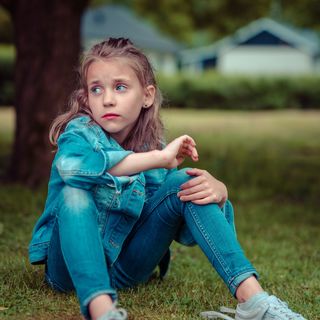
Suicide
Talking to My Granddaughter About Suicide
How do you tell a child about an uncle who killed himself long before her birth?
Posted August 13, 2018

From the time she was a small child, I wondered how I would talk to my granddaughter about my son, her Uncle Aaron, who took his own life before she was born.
I wanted her to know Aaron, to know that he was a beloved part of our family, that though he was dead, he was still important to us. She would also have to know eventually about the schizophrenia he lived with for ten years, which proved to be, in his case as in many others, fatal.
I think she was about four when I began to mention him. And almost at once she wanted to know how he had died. At that point her mother gave me a now-see-what-you’ve-got-us-into look. “He died of a bad illness,” I said, which was true, and enough for Iliana for some years.
At the graveyard on the anniversary of Aaron’s death, she liked to help me scrub the year’s accumulated grime from the stone before we placed the pebbles that said we had been there. She asked her mother, “Did you feel sad when Aaron died?” “Of course I was sad. He was my brother.”
When my book Losing Aaron was published I was careful to keep it out of sight—not secret, but not lying around where it would elicit questions. This past spring, as her tenth birthday approached, I forgot one day and left a copy of the book on the living room coffee table. As she picked it up, I debated with myself whether to take it from her, as I had done on past occasions. But this time I didn’t. And so she read the back cover, and a moment later, she said, “Suicide! Aaron committed suicide?”
It took me a minute to get my bearings.
“Yes, he did.”
“He killed himself?”
“Yes.”
“How did he do it?” I was silent. It was too brutal to tell her he had hanged himself. I didn’t want her to have that image in her head.
“Did he use a gun?”
“No.”
“Did he choke himself?” She put her hands to her throat.
“Yes.” I could see her grappling with this. “With a rope,” I said.
“How did he get it?”
“He bought it.”
“How did he get the money?”
“He had money. A rope doesn’t cost much. ”
“If I was there, I would take away his money,” she said. “So he couldn’t do it.” I began to cry as she talked. It was so moving to see her trying retroactively to prevent Aaron's death, just as I had done myself. My first thought when I got the news had been ‘We’ll talk to him, we’ll tell him he doesn’t have to do this.’
"Why did he do it?" she asked.
“He was very unhappy."
“Why did this happen to our family?"
“It just did. I don’t know why.”
"Do other people do it?
“Yes.
“Why didn’t you tell me?”
“Would you tell a five-year-old?” I asked her. She accepted this.
“I want to talk to Mommy.”
So we called Stasha and turned the speakerphone on. Iliana repeated her questions and Stasha answered much as I had. We hung up and Iliana wanted to go home. When we got there she asked again why Aaron killed himself.
“He was unhappy,” Stasha said. “He had something wrong with his brain. It was telling him bad things.” Iliana accepted this and didn’t need to know more. But she told her father, “It’s going to take a long time to process this.”
Unexpectedly, when she told a friend at school the next day, her friend said, “My uncle did that too.” I was relieved that she wouldn’t feel so alone, that she knew now that suicide happens to other families also. And I was relieved that we didn’t have to keep the way Aaron died secret any longer. I wouldn’t have to remember to hide Losing Aaron, to make sure I hadn’t left something about Aaron up on the computer screen where she might see it.
For more on the story of Aaron see my earlier blog or read my book.

